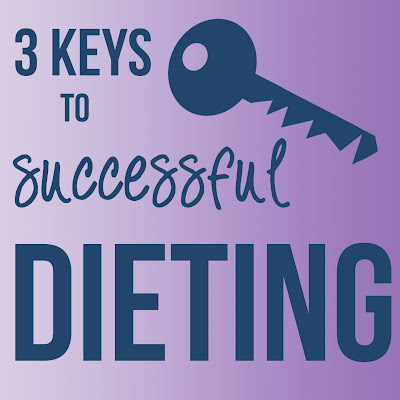I've never been a fan of fad diets. Cutting out an essential part of the diet, such as carbs or fat, never seemed like a good idea to me. If you try a diet in which you have to drastically alter what you eat, you're probably not going to stick to it. You can't keep not eating carbs forever.
So what happens when you start eating carbs again? You gain back the weight.
Why? Because you have not made a maintainable, long-term change to your eating behavior.
Fad diets make things complicated. The best approach to dieting is a simple one: keep a food journal and count your calories.
Your main focus should be setting a calorie goal and sticking to it. For more information about working out how many calories you should be eating, see
here.
Let's get a little scientific for a minute. I promise it won't be too horrible :)
Last year a study was conducted on the impact of a wide range of diet-related behaviors and meal patterns and their effect on weight change. These were the main conclusions of the study:
In the study, women who kept food journals lost about 6 lb more than those who did not.
It's pretty dang hard to change your eating behavior if you don't pay attention to what you're eating.
I know that there have been days in the past where I have assumed that I wasn't eating a lot of calories when I was actually eating a ridiculous amount.
Example:
I love Chili's. When we go there John and I usually share a half order of Texas Cheese Fries and then I get a Classic Bacon Burger with a side order of fries. Yep, that's a lot of fries for one night.
I never really thought about how many calories I was eating. I guessed it was a lot but I wasn't sure exactly how much.
I decided to look it up one day. Guess how many calories that meal was.
2350
I could not believe this. I had been eating way more calories than I thought I was
Using a diet journal is easy. It doesn't take a lot of time. You don't have to use it every day for the rest of your life if you don't want to. It's good to track your calories for a few weeks every day. Then you will gain a sense for how many calories different foods contain. Then you can just use a diet journal every now and then to stay on track or you can continue to use it every day.
Tips for using a diet journal:
Measure your servings. When you're counting calories it is important to pay attention to serving size. Don't just assume that you are just having one serving. Read labels and measure it out. For example, one serving of milk isn't a large glass of milk. It is one cup of milk.
Be honest. Record everything that you eat. Those fries that you stole off your boyfriend/husband's plate do count. Make sure you include toppings and condiments in your calorie count.
Be conscientious. Take your diet journal with you everywhere so you don't have to try to remember what you ate later. Use it every day for at least a couple of weeks.
Here a few printable food journal pages that I made that you are welcome to download.
There are also some good apps for counting calories. My favorite is MyFitnessPal.
In the study, women who skipped meals lost almost 8 fewer pounds than women who didn't.
Skipping meals is a bad idea. We all know it's not very fun to be really hungry. Often when you skip a meal you end up binging later on in the day and making up the calories from the skipped meal.
There's also the issue with your metabolism. You burn calories most efficiently when you eat at regular intervals throughout the day. The best thing to do is to eat five or six small meals a day.
Skipping meals is also thought to cause you to respond more favorably to high-calorie foods. This means that you will probably end up eating more calories than you would have if you hadn't skipped the meal.
In the study, women who ate out for lunch at least weekly lost an average of 5 fewer pounds than women who ate out less frequently.
I don't mean never eat out. It's fun to eat out every once and a while. Just make sure to limit how often you eat out. Also, when you do eat out, pay attention to the number of calories you are eating. Maybe only eat half of your meal that day.
Kong A., Beresford S.A.A., Alfano C.M., Foster-Schubert K.E., Neuhouser M.L., Johnson D.B., Duggan C., (...), McTiernan A. Self-Monitoring and Eating-Related Behaviors Are Associated with 12-Month Weight Loss in Postmenopausal Overweight-to-Obese Women (2012) Journal of the Academy of Nutrition and Dietetics, 112 (9) , pp. 1428-1435.



























